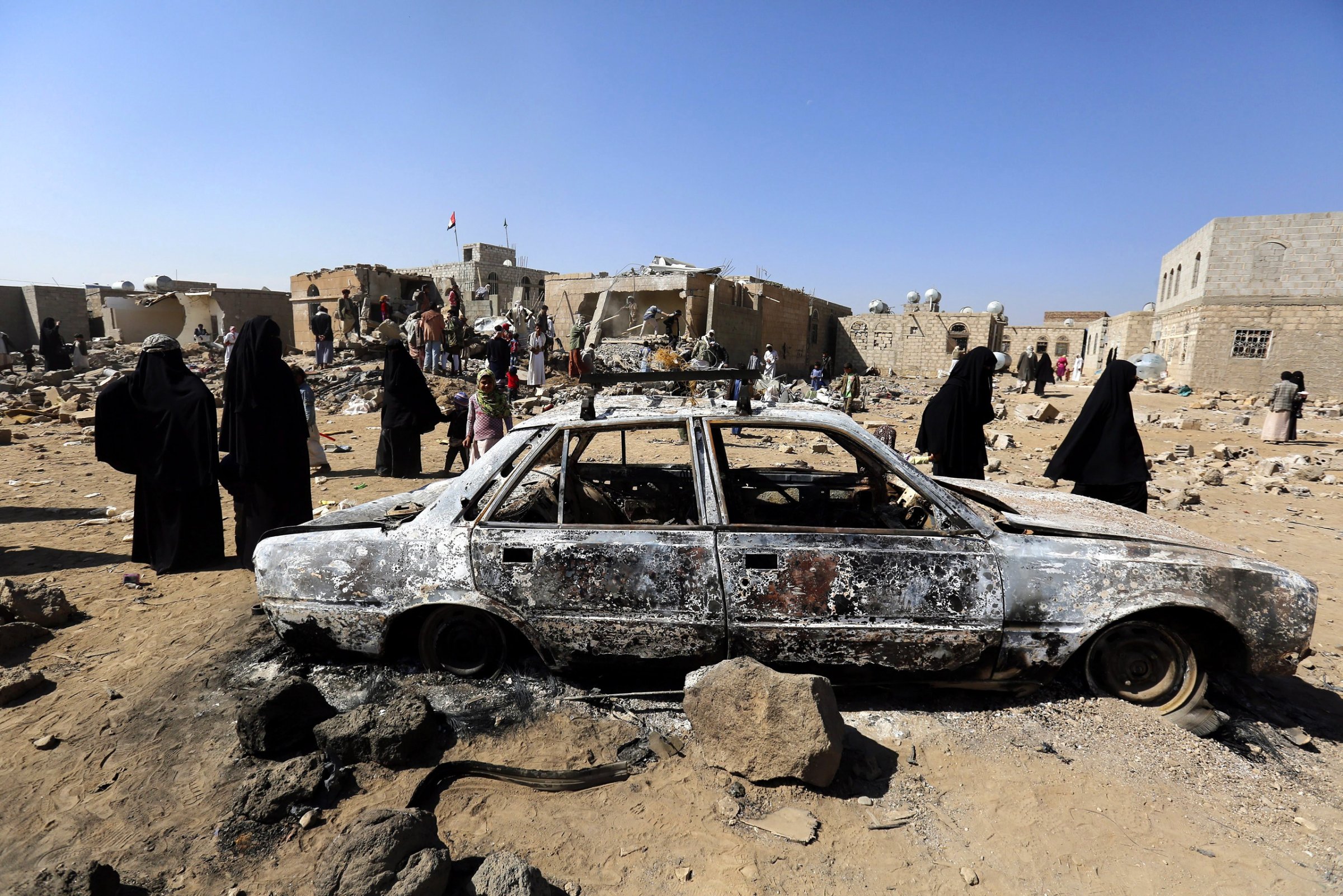
As Yemen’s bloody conflict continues and medical facilities repeatedly come under fire, the wreckage of hospitals and clinics highlights the ugly fact that this war between a Saudi-led coalition and Houthi militants is being fought with utter disregard for international humanitarian law—and with the silent consent of the U.S., the U.K., France and other members of the U.N. Security Council.
Doctors Without Borders/Médecins Sans Frontières (MSF) has treated more than 20,000 people in Yemen since last March. Over the past three months, however, three clearly marked MSF-supported health facilities in Yemen have come under attack, in clear violation of the laws of war and the protections those laws afford medical spaces, patients and personnel.
On Jan. 10, a projectile hit Shiara Hospital in northern Yemen, killing six and injuring seven. MSF had been helping rebuild the facility—coalition air strikes had struck it twice before—and providing emergency care, but some patients have refused to come back for fear of yet another attack. Pregnant women have given birth in nearby caves rather than re-enter the hospital.
On Dec. 2, air strikes targeted a park in Taiz, in southern Yemen. Staff from an MSF clinic went to evacuate the wounded, informing the coalition of their movements. Soon after, another air strike hit the MSF clinic itself, injuring nine people, including two staff members.
And on Oct. 26, coalition fighter jets bombed a hospital in Saada governorate’s Haydan District where MSF teams were working, destroying the only emergency care facility for some 200,000 people in the area.
MSF regularly provides both the Saudi-led coalition and Houthi forces with GPS coordinates for our projects and reiterates their obligations to preserve access to medical services. But between March and November of last year, bombs were dropped on or near medical facilities nearly 100 times, according to the International Committee of the Red Cross.
Such is the nature of this war.
The Saudi-led coalition is waging a military campaign that treats civilians and civilian structures as legitimate military targets. Coalition warplanes and artillery have hit homes, schools and displacement camps—particularly in the north—killing upwards of 2,800 civilians, according to the U.N.
Houthi forces have also shelled civilian areas and medical facilities and blocked shipments of medical supplies, particularly in Taiz. For the past five months, the city’s nearly 100,000 people have endured mortar fire and sniper attacks while running desperately short of food and water. The few hospitals still open barely function due to shortages of supplies and fuel.
A U.N. committee monitoring Yemen reportedly documented “widespread and systematic” targeting of civilian structures, but, ironically, it was last April’s U.N. Security Council Resolution 2216—authored by Jordan, co-sponsored by the U.S., the U.K. and France—that provided cover for what we’re seeing today. While making pro forma calls to end the violence, the resolution demanded nothing of the coalition and didn’t mention the aerial attacks that had already begun. It essentially provided a license to bomb and enforce a blockade of goods entering the country, setting an “anything goes” tone all sides have embraced.
The warring parties pay little heed to the Geneva Conventions, and their backers say little. The U.S., the U.K. and France support and supply weapons to the Saudi military, ignoring the fact that even if medical facilities are not targeted intentionally, failure to distinguish between military and civilian targets is itself a violation of international humanitarian law.
The Saudi-led coalition, the Houthis and their backers must all honor international humanitarian law and be held accountable for violations. MSF has called for the mobilization of the International Humanitarian Fact-Finding Commission, a body born of the Geneva Conventions to independently assess violations of humanitarian law, to investigate the Jan. 10 attack on Shiara hospital. Days later, the Saudis announced the formation of an internal committee to investigate its conduct in Yemen. That can be the beginning, but it can’t be a substitute for an independent, impartial inquiry.
Actions—or rather restraint—will show whether or not this is anything more than lip service. If more hospitals are destroyed, there may not be anyone left to provide the care Yemenis will doubtlessly need in the days ahead.
More Must-Reads from TIME
- Donald Trump Is TIME's 2024 Person of the Year
- Why We Chose Trump as Person of the Year
- Is Intermittent Fasting Good or Bad for You?
- The 100 Must-Read Books of 2024
- The 20 Best Christmas TV Episodes
- Column: If Optimism Feels Ridiculous Now, Try Hope
- The Future of Climate Action Is Trade Policy
- Merle Bombardieri Is Helping People Make the Baby Decision
Contact us at letters@time.com